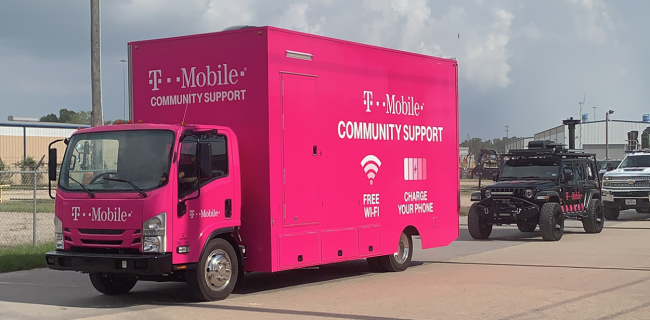“Disasters All Have the Same Backbone” T‑Mobile Senior Disaster Recovery Manager Becky Romero keeps evolving the company’s response to challenges during hurricanes, wildfires and even a pandemic — because at any point, any of us could be affected.




 Northampton, MA
|
October 27, 2021 01:31 PM Eastern Daylight Time
Northampton, MA
|
October 27, 2021 01:31 PM Eastern Daylight Time

“Disasters all have the same backbone,” says Becky Romero. “They all have the same spine. They just have different arms and different feet. They have different limbs. And a wildfire is slightly different than a hurricane, which is 100 percent different than civil unrest, which is completely different than COVID, which is different than an earthquake, which is different than a volcano eruption. Different than the Texas winter storm that we had. The constant is the help needed.”
And for much of her career, Romero has supplied that help.
The Deer Park, Texas-based Senior Disaster Recovery Manager for T-Mobile went from helping provide service to cell towers affected by outages as a contractor to focusing on disaster Business Continuity and Community Support full-time for the company.
Today, you can find Romero innovating response protocols to more seamlessly and effectively mobilize and serve the communities in times of need.
Rather than house supplies in one location for packing and shipping when needed, Romero asked, Why not have supplies and trucks ready to go from all over the United States?
As T-Mobile recognized the need for more robust responses to disasters, Romero’s growing team secured more resources, including more local storage and trucks to move equipment quickly.
“We have grown from three trucks dedicated to our team,” she says, “all the way up to eleven trucks and ten warehouses. Do other carriers show up? Sure, they do. Do they show up like us? Absolutely, unequivocally, no. We have it, we know we have it, it’s organized, and we’re able to get it out in a very clear, concise process. That makes us show up as T Mobile.”
When a hurricane, wildfire or other natural disaster ravages a community, Romero and her team carefully monitor the situation, first making sure all of Team Magenta is safely home. Then her team leads the deployment of trucks carrying of much-needed supplies.
“We use our smaller, more nimble trucks during wildfires,” she says. “They’re good for when multiple shelters are housing people that have really lost everything. It is all about making those people feel comfortable that we are here to support them. We do not care what their background is. We don’t care where they live, and we don’t care what provider they’re with. We are simply there to serve them.”
As the team distributes supplies inside a shelter and returns to the warehouse to restock, again and again, Romero monitors each shelter site’s needs. Sometimes, cell phones are the biggest ask. In other situations, power sources for people to charge their devices might be pivotal.
“Sometimes they’re in old gymnasiums,” she says, “where there may be two or three plug-ins for the whole gymnasium. And people can’t keep their phones charged.”
Romero says hurricane responses are typically her opportunity to help organize a full deployment. When Hurricane Ida impacted Panama City earlier this year, she coordinated a truck to be deployed for a week to serve the community. Stationed there for months, she and her team stocked the truck with day-one and day-two kits, carrying ready-to-use phone-charging cables, constantly checking for supply exhaustion and creating replenishment schedules.
“What’s nice is having ten warehouses nationwide; if Panama City got hit again, the warehouse in Alabama is an hour and a half north there, so I can replenish them within about four hours if they run out. If Houston gets impacted, I have a warehouse in Dallas. If it gets impacted in Tampa, I’ve got those in Alabama. That’s about a ten-to-twelve-hour drive. And then I’ve also got Miami, and that’s about a six-hour drive.”
With just a few exceptions, Romero says she’s confident her teams can hit almost every state within twelve hours to replenish or deploy.
“Really, the fun part for me is the strategy,” she says. “How do we do it better? Listening. It excites me listening to our people, to understand their pain points and understand what did work and capitalize on that to make it better.”
While T-Mobile closed 80 percent of its stores at the outset of the pandemic, COVID forced stricter cleaning protocols to keep the team and customers safe at open stores. And essential businesses and the general public were competing for increasingly scarce sanitizer and other cleaning supplies.
To avoid certain store closures should sanitizer run out, Romero identified an exceptional solution: a fuel delivery company she’d worked with was making its own cleaning supplies. Confirming the product met all the standards of T-Mobile’s Environmental Health & Safety Team, she worked with them to get orders in and figure out transport.
“We can’t, as an organization, ever do the same thing that everybody else is doing,” she says, “because every time we go down the path of what everybody else is doing, we’re going to come to a roadblock because it’s been done. And just like in this case, the supplies we needed were gone. Looking into creative solutions that no one else has tapped into is key.”
Because disaster response helps everyone learn how to navigate challenges that could eventually affect us all.
View additional multimedia and more ESG storytelling from T-Mobile on 3blmedia.com